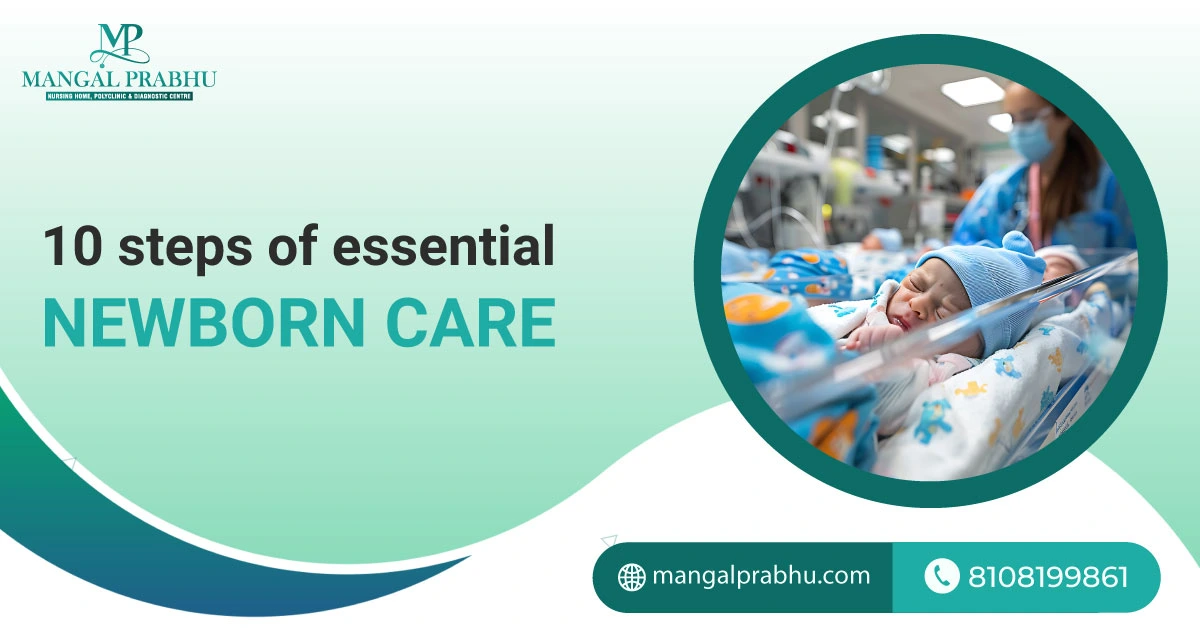
10 Steps of Essential Newborn Care
Newborn care is essential for healthy and proper development during those first precious moments and days. Your little one needs the best care and immense parental love and attention for steady growth.
To help you understand basic newborn care practices, we’ve researched 10 steps of essential newborn care that every parent needs to know. Here’s what to follow at the children’s hospital in Navi Mumbai and after discharge.
10 Steps of Essential Newborn Care:
Step 1: Immediate Skin-to-Skin Contact
Skin-to-skin contact, or the direct contact of the newborn with the mother, takes place naked on the mother’s chest, such that only her face is visible. Generally, most practitioners have been observed to conduct skin-to-skin contact within 10 minutes immediately after birth.
Soon after delivery, placing the baby on the mother’s chest tends to regulate the child’s temperature, breathing, and heart rate. It encourages bonding and provides emotional security right after delivery.
Step 2: Delayed Cord Clamping
Delaying the clamping of the umbilical cord to 1-3 minutes allows for more blood to continue flowing from the placenta to the baby. This generally helps boost the babies’ iron levels and reduces the chances of those babies developing anemia.
Step 3: Initial Breastfeeding
An early introduction to breastfeeding is essential. Breast milk provides the baby with all the nutrients and antibodies that protect them from infections.
Step 4: Proper Hygiene and Cord Care
Bathe the cord area and keep it dry to avoid infection. The cord will fall off automatically within a few days, so do not try to pull it off manually.
Step 5: Temperature Regulation
Newborns are sensitive to temperature, and warmth is essential for maintaining temperature levels. Cover them with blankets or warm clothes, especially in the first few days. However, void overclothing. The room temperature must be comfortable.
Step 6: Eyes Care and Administration of Vitamin K
Eye care involves newborn antibiotic eye ointment to prevent infection. A Vitamin K shot prevents newborns from getting bleeding disorders, which they are vulnerable to in the early days. Breast milk doesn’t have an adequate amount of Vitamin K, so it’s important to introduce them to vitamin K drops.
Step 7: Immunizations and Screening Tests
Newborns should receive their first vaccinations, including hepatitis B, to protect them from serious infection. Their screening tests, including hearing and metabolic, may identify problems early on.
Step 8: Monitoring for Jaundice
Jaundice is a common condition in newborns. Regular monitoring detects whether the skin or eyes start to yellow so treatment can begin before complications arise.
Step 9: Safe Sleep Practices
Newborns may be positioned on a firm mattress on their backs as a preventive measure against sudden infant death syndrome. Ensure that every loose bedding and pillow is removed from the baby’s sleeping environment.
Step 10: Regular Health Check-ups
Regular visits to the doctor in the first few weeks track development and check whether the baby is developing well and in tandem with set milestones. A pediatrician will walk parents through this crucial stage of assessment.
Conclusion
Following these 10 essential steps for newborn care ensures that your baby gets the attention and support needed for a healthy start, from skin-to-skin contact and regular check-ups to all the essentials covered here. Consult a pediatrician in Navi Mumbai for professional guidance and support during this vital stage.
